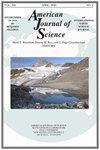太行山和郯庐断裂中南部晚中生代花岗岩的年代和地球化学变化——对华北克拉通岩石圈破坏的启示
IF 2.5
3区 地球科学
Q3 GEOSCIENCES, MULTIDISCIPLINARY
引用次数: 1
摘要
在中生代晚期,华北克拉通(NCC)经历了显著的岩石圈减薄和破坏,尤其是在东部,但与这一过程相关的机制和时间仍存在争议。太行山(TH)位于北卡罗莱纳州东部的西部,郯庐断裂(TLF)位于东部,是揭示深层岩浆成因过程的两个重要岩浆区。我们研究了这两个地区火成岩的时空分布,以限制构造背景和岩浆来源。TH区北部房山岩体中花岗质岩石的SHRIMP锆石U-Pb年龄范围为136~128Ma,εHf(t)值和δ18O值范围分别为−27.7~−18.5和6.68~7.26。因此,我们得出结论,这些岩石是由底侵岩浆和下地壳熔体混合形成的。本文还报道了云南北部云梦山杂岩体6个花岗岩样品的O—Hf同位素组成。结合前人的研究,我们认为TH地区岩浆岩的地球化学特征在中生代晚期变化不大,但TLF地区的岩石变化很大。这两个区域之间的差异可能反映了古太平洋俯冲过程的不同影响。TLF地区的高Mg#adakitic岩石(HMA)的Mg#值高于TH地区的HMA岩石。我们的结论是,TLF地区的HMA岩石主要是由分层的下地壳与地幔物质相互作用形成的,古太平洋俯冲对TH岩浆的影响有限。根据年表和地球化学特征,我们确定了三个阶段:1)~166-140 Ma,多向挤压导致NCC地壳缩短和增厚,伴随着地壳的区域部分熔融和镁铁质岩浆的底侵作用;2)140-125 Ma,TLF经历了左旋走滑运动。随后,断层和NCC周围的下地壳分层演化为伸展构造环境,3)125Ma后,NCC的大规模伸展可能是由于分层后的应力松弛。TLF是地幔物质和流体输送的有利通道,这表明大规模断裂带是NCC岩石圈破坏的关键因素。本文章由计算机程序翻译,如有差异,请以英文原文为准。
Chronological and geochemical variations of the late Mesozoic granitoids in the Taihang Mountains and middle-southern Tan-Lu Fault: Implications for lithosphere destruction of the North China Craton
In the Late Mesozoic, the North China Craton (NCC) underwent significant lithospheric thinning and destruction, especially in the eastern part, but the mechanism and timing related to this process are still contentious. The Taihang Mountains (TH) are located in the western part of the eastern NCC and the Tan-Lu Fault (TLF) is in the eastern part, which are two essential magmatic areas that reveal deep processes of magma origin. We investigated the spatial-temporal distribution of igneous rocks from these two areas to constrain the tectonic setting and magmatic sources. SHRIMP zircon U-Pb ages of the granitoids within the Fangshan pluton in northern TH area range from 136 to 128 Ma. Their εHf(t) values and δ18O values show ranges of −27.7 to −18.5 and 6.68 to 7.26 permil, respectively. Hence, we conclude that the rocks were formed by mixing between underplating magma and the melts from the lower crust. The O-Hf isotopic compositions of six granitoid samples from the Yunmengshan complex in northern TH are also reported. In combination with previous studies, we propose that the geochemical characteristics of the magmatic rocks from the TH area had insignificant changes during late Mesozoic time, but the rocks from the TLF area varied greatly. The difference between those two areas may reflect the diverse impact of the Paleo-Pacific subduction process. The high Mg# adakitic rocks (HMA) from TLF area have higher Mg# values than the HMA rocks from TH area. Our conclusion is that the HMA rocks in the TLF area were mainly formed by delaminated lower crust interacting with mantle materials and that the Paleo-Pacific subduction had limited impact on TH magmas. Based on chronology and geochemical characteristics, we recognize three stages: 1) ∼166 to 140 Ma, multi-directional compression resulted in crustal shortening and thickening in the NCC, accompanied by regional partial melting of the crust and underplating of mafic magmas, 2) 140 to 125 Ma, the TLF underwent left-lateral strike-slip movement. Subsequent delamination of the lower crust around the fault and the NCC evolved into an extensional tectonic environment, 3) after 125 Ma, a large-scale extension of the NCC occurred likely due to stress relaxation after delamination. The TLF acted as a favorable channel for transporting mantle material and fluids, which implies that the large-scale fault zone was a key factor of the NCC lithosphere destruction.
求助全文
通过发布文献求助,成功后即可免费获取论文全文。
去求助
来源期刊

American Journal of Science
地学-地球科学综合
CiteScore
5.80
自引率
3.40%
发文量
17
审稿时长
>12 weeks
期刊介绍:
The American Journal of Science (AJS), founded in 1818 by Benjamin Silliman, is the oldest scientific journal in the United States that has been published continuously. The Journal is devoted to geology and related sciences and publishes articles from around the world presenting results of major research from all earth sciences. Readers are primarily earth scientists in academia and government institutions.
 求助内容:
求助内容: 应助结果提醒方式:
应助结果提醒方式:


